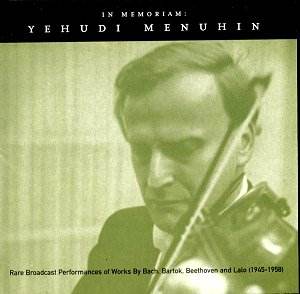AVAILABILITY
www.musicandarts.com
This Memorial tribute to Yehudi Menuhin was issued
relatively soon after his death and its documentation consists
entirely of a lengthy and sympathetic obituary written by Allan
Kozin that appeared in The New York Times. The repertoire is strongly
associated with Menuhin and these additions to his discography
are in the main attractive, noble, elevated and impressive. There
is one exception, which is the Lalo, shorn of the Intermezzo and
indicative of some besetting faults in his technique but elsewhere
the 1945-58 recordings reflect well on him, though it canít be
denied that ingrained frailties do recur.
The Beethoven concerto dates from December 1945
and once past some poor broken octaves and what sounds like a
queasy side-join at 4.26 things settle down quite nicely. The
recording quality is otherwise quite acceptable for its date and
circumstances. The performance contains elements of Menuhinís
loftiness and nobility of spirit, his tone still eloquent and
occasionally bewitching. Rodzinski contributes strongly though
his occasional brusqueness, whilst perhaps befitting Beethovenian
psychology, can tend toward the military. Accents can be trenchant
and brass can be unyielding. The Larghetto is really quite slow
with Menuhin vesting his paragraphs with increased tone colours
and vibrato. His intense expressivity, an inwardness amounting
almost to spiritual communion, is rapt in its stillness, though
the elegiac tone can be unvaried. In the finale Rodzinski is again
a little peremptory and Menuhin projects well, and even if some
sections hang fire fractionally this is still an impressive reading.
The Bach Double, one of his favourites, sees
him paired not for the first or last time with David Oistrakh.
They are joined by the Enescu Philharmonic conducted by George
Georgescu, amongst whose many accomplishments was a thoroughly
sympathetic command of Straussís idiom. This is a grandly romantic
performance warmly greeted by the Bucharest audience whose enthusiasm
I share. The recording is rather stark but canít efface the gorgeous
interplay between the two, Menuhin playing secundo by the way.
The Bartók Second Concerto derives from
a Lucerne Festival performance in August 1947 in which he was
accompanied by LíOrchestre de la Suisse Romande conducted by Ernest
Ansermet. This was a work he recorded three times commercially,
twice with Dorati and in 1953 with Furtwängler. I believe
that this Ansermet performance, by six years the earliest known
example of Menuhinís playing of the work, was once available on
a Bruno Walter Society LP. The discs begin rather roughly and
the sound is somewhat constricted but one can still listen through
these relative imperfections to hear Menuhin in a work so closely
associated with him. The opening movement is abundantly lyrical
and virtuosic, Menuhin shaping the line with intimacy and candour
and some real and vibrant playing graces the cadenza. True quite
a lot of orchestral detail is obscured, which makes a complete
enjoyment of this survival necessarily limited but in a release
devoted to the violinist one can but admire his intensely effulgent
tone and rhapsodic beauty in the Andante tranquillo as much as
his drive, élan and reflective generosity in the finale.
There is a 1978 San Francisco interview with Frederick Maroth
in which Menuhin reflects on his relationship with the composer
and characterises things in his pithy, unusual and thoughtful
way.
I wonít say much about the Lalo. Itís in horribly
glassy and blowsy sound and Menuhin sounds uncomfortably close
to the mike. Heís anyway in poor form intonationally and technically,
sounding unhappy, coarse-toned and often playing sharp. Stick
with the Enescu 1932, or the Fournet or Goossens if you have them.
Aside from this aberration what remains Ė and I wouldnít for a
moment seek to deny the vicissitudes of the middle and later years
Ė is a musician of nobility and breadth, whose humanity is generally
well-served by this memorial release. The Beethoven and Lalo have
previously appeared before but only in Japan, the Bach in Russia.
The Bartók is apparently a first release on CD.
Jonathan Woolf
